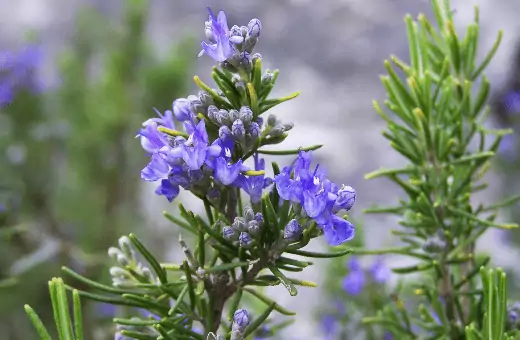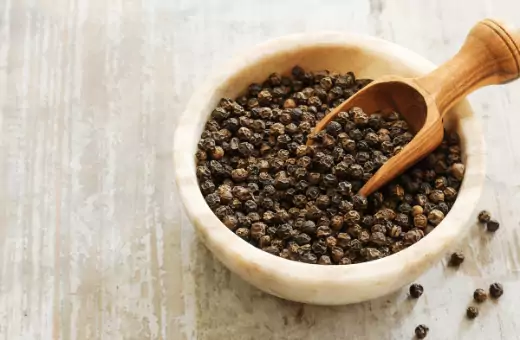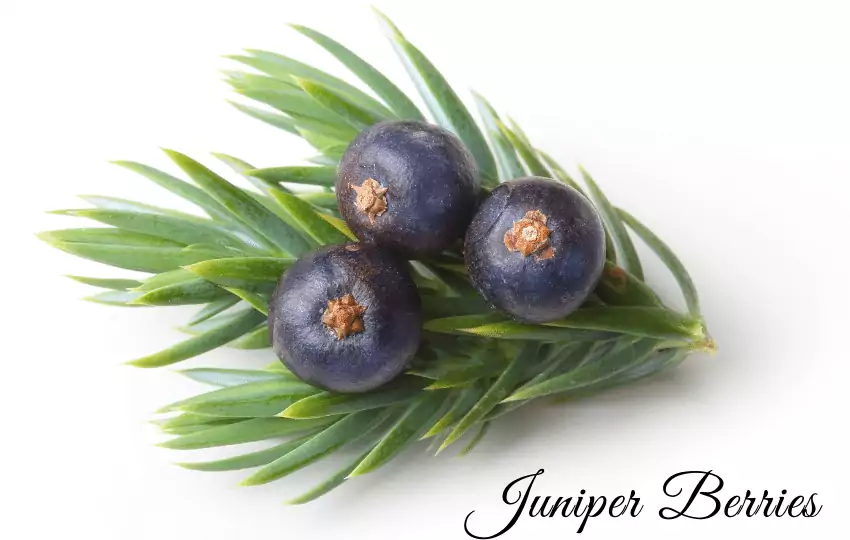Juniper berries are the dried, ripe fruit of juniper plants. These fruits are known for their unique flavor and aroma to be used in gin or other spirits, sauerkraut, baking, or other dishes requiring a sour taste.
But what if you don’t have any? What can you substitute for Juniper Berries?
Some of the ingredients such as – Bay leaves, Gin, Black pepper, Cardamom, and more can use instead of juniper berries in your recipes.
But it is a notable point that each and every ingredient must use in a certain amount that also mentions the upcoming section. So stay tuned and keep reading.
What’s a Juniper berry?
A juniper berry is a young, bright green, single-seeded cone produced by various species of junipers. These berries are not part of a ripened ovary as thought but are made from the eponymous scales of the woody cones.
The seeds from those berries can be pressed to yield an oil rich in the omega-3 fatty acid alpha-linolenic acid.
What do Juniper Berries Taste Like
They have a sweet yet slightly tart flavor that is similar to cranberries. Some people say they taste like gin since juniper berries are used as a flavoring agent in gin.
The gin and tonic is likely the most well-known cocktail that features juniper berries as an ingredient. The berry adds a slightly piney/peppery flavor to cocktails and other dishes, such as meat or lamb.
7 Substitutes for Juniper Berries
1. ROSEMARY
Rosemary is a fragrant herb often used as a substitute for juniper berries. It has a similar flavor and can be used in the same way.

The best part of Rosemary is available year-round. It is sold fresh, dried, powdered, and as an extract. Rosemary grows wild but can also be cultivated by gardeners.
Note- Use 2-3 sprigs for 8-9 juniper berries.
You can use both fresh and dried versions: Fresh rosemary has a slightly pine-like taste and is used in savory dishes. Just chopped and added to recipes during the cooking process.
Dried rosemary has a more potent flavor and is often used in baked goods and meat dishes. Dried rosemary can be added directly to recipes or ground using a mortar and pestle or electric spice grinder.
Rosemary can also be steeped in hot water to make a tea that is used as a flavoring agent for various recipes.
2. GIN
The most obvious alternative to juniper berries is, of course, gin. We won’t go into any detail here as to why people use juniper in gin, but if you are looking for recipes, there are many.
Note- 1 teaspoon GIN = 1 tablespoon of juniper berries.
Gin is a delicious beverage that can be used in many different ways. When you choose your gin, it might help to know what flavorings will go into making the drink and how those flavors affect its taste profile, so they match more closely with other gins on hand.
3. BAY LEAVES+LEMON GRASS
Juniper berries are a unique and exotic flavoring for a variety of dishes. They can be challenging to find in some areas, so substitutes may need to be used from time to time. It is sometimes even possible to grow juniper bushes on a kitchen windowsill or door porch.
In most recipes, Bay leaves can be used as a substitute for juniper berries. They have a similar flavor but are not as potent.
Note- 2-3 Bay leaves= 2 teaspoons of juniper berries
Use Wild lemongrass along with Bay leaves, although it has a more lemony flavor than the bay leaf. Orange peel can also add a slight citrus taste to the dish. Experiment with the different flavors and find the one that best fits your recipe.
4. BLACK PEPPER
If you’re searching for a substitute for juniper berries in a recipe, black pepper is a good option. It has a similar flavor profile and can be used similarly.

Black Pepper is readily available at your local market. The flavor of pepper as a replacement for juniper berries is slightly less pungent, but not by much.
Note- Use about 2/3 as much black pepper as you would juniper berries in any recipe to achieve similar flavors.
5. CARAWAY SEEDS
Caraway Seeds resemble Juniper Berries in flavor and have been used as a substitute. It has a slightly lemony flavor and pairs well with pork and cabbage.
My first thought was that caraway seeds might be an excellent alternative to juniper berries because they are both spices used heavily in German cooking. Still, I decided to do some tests just to make sure before mentioning it here on German-American Food.
My fiancee and I taste them, using equal amounts of caraway seeds and juniper berries, giving the tester no idea which of the two is being tasted.
His response: “That’s definitely not juniper berry.” In other words, you can’t use caraway seeds as a direct substitute.
Note- Try to use 2 teaspoons caraway for 4 berries.
However, suppose you are looking for something similar to the flavor of juniper berries. In that case, caraway seeds might be a good option.
6. CARDAMOM
Cardamom and Juniper Berries substitute each other well. They both share an aromatic, resinous flavor which is citrusy and fresh, with a hint of pine and cedar.
Note- 1 teaspoon ground Cardamon=1 teaspoon of Juniper berry
Cardamom is the seeds pod of tropical flowering plants native to Asia that can be used whole or powdered. It has a robust and distinctive taste with hints of camphor, mint, peppermint oil, or lemon peel.
7. HICKORY SPICE
The piquant flavor of hickory smoke makes it a good substitute for juniper in gin. Add 1/4 ounce hickory extract to the alcohol and water mixture with the juniper.
Read More– 7 Green Curry Paste Alternatives
Substitute for Juniper Berries in a Recipe
If you’re searching for a substitute for juniper berries in a savory recipe, consider using black pepper or thyme in their place.
These ingredients have a similar flavor to juniper berries and can be used in recipes that call for them. If the two flavors are not similar enough, consider using gin instead or omitting it from the recipe altogether.
If you need a substitute for juniper berries in a sweet recipe, consider cranberries, black currants, or redcurrants. These fruits have a similar flavor to juniper berries and can be used in recipes that reach for them.
These fruits have a similar flavor to juniper berries and can be used in recipes that call for them.
Another option is to use gin in place of the juniper berries. This will impart a similar flavor to the dish.
Lastly, you can also omit the juniper berries from the recipe if they are not essential to the flavor. However, keep in mind that missing them may change the dish’s overall taste.
A good substitute for juniper berries in gin
When making gin, juniper berries are, of course, always used. One could say they are the defining ingredient in most gin recipes.
So it is not surprising that many people find out (usually the hard way) that juniper berries are actually surprisingly difficult to come by.
And this can be pretty annoying, considering how important they are for gin distillates to turn out well.
Fortunately, there are good alternatives for juniper berries out there. One of them is the seed of the coriander fruit. Coriander seeds have a similar flavor to juniper berries but are more subtle. They can be easily found in most supermarkets and are very affordable.
Another option is cardamom pods. These have a distinctly different flavor than either juniper or coriander but can work well in similar ways. They are also well accessible and affordable, just like coriander seeds.
In their gin recipes, you can even use high-quality dried rosemary instead of juniper berries. Rosemary has a robust flavor that is quite different from juniper berries, so it’s important to go easy on this one when subbing it in.
But if you like the taste of rosemary, it can make for a really interesting-tasting gin.
So if you’re ever in a spot and can’t find juniper berries, don’t worry! There are a bunch of proper substitutes out there that will still give your gin recipe the flavor it needs.
Some people also use pine instead of juniper in their gin, so you may try once. Pine has a very distinct flavor that works quite well. Still, purists argue that it really isn’t gin if purin (or other trees, for that matter) are used in the botanical mix.
There are still more alternatives, like heather flowers, which have a sweet and floral taste. Again, if you can’t find juniper berries, any of these substitutes should do the trick in your gin recipe. Simply try different things till you find what you like most!
In conclusion, juniper berries are not the only option for flavoring gin. Many other alternatives can give you the same flavor profile.
How many Juniper Berries are in a Tablespoon
There are about 15 juniper berries in a tablespoon. Juniper berries are being used to flavor foods and beverages and in some traditional remedies.
They have a slightly sweet, piney flavor and are typically used to flavor gin, Vermouth, and other spirits. Some people use them to prepare tea or to make potpourri.
The best substitute for juniper berries in baking
In baking, the best substitute for juniper berries is sometimes breadcrumbs, sometimes cranberries.
Cranberries are aromatic berries that taste tart-sweet. They’re also incredibly sour. If you think you have a recipe for something with either juniper or cranberry in it, experiment with it.
Substitute for juniper berries in sauerkraut
There are various options for adding a juniper flavor to sauerkraut.
One option is to add fresh or dried juniper berries to the fermenting sauerkraut.
Another option is to use juniper extract, which can be found online or at specialty stores.
A third option is to soak juniper branches in water and use the branches as a flavoring in the sauerkraut.
No matter which option you choose, adding juniper to sauerkraut will add a unique flavor and complexity to the ferment. If you are new to using juniper in sauerkraut, start with a small amount and taste as you go.
Does juniper berry smell like pine?
Juniper berry does not smell like pine. It has a very strong, distinct aroma often associated with Christmas trees.
Some people describe the scent as fruity, woodsy, or even peppery. While some may find the smell irritating, it is actually rather refreshing. It can be used to create a variety of scented products.
For example, juniper berry essential oil is often used in aromatherapy to help stimulate the senses and improve focus. It can also be added to lotions, soaps, and other personal care products.
Wind-up- Juniper Berries Substitute
Understanding which one is best for you with so many substitutes to choose from. You want a replacement that will have the same flavor properties as Juniper berries and offer other benefits in terms of nutrients or cost savings. Try these options and see what works best for your recipe!
FAQs Related on Juniper Berries & Its Alternatives
Q1. What are juniper berries for cooking?
Juniper berries are used in a variety of cuisines as a flavoring agent.
You can be added to meat or vegetable stews, and they are also used in making pickles.
In addition, juniper berries can be used to make a tea that is said to be helpful for digestion.
Some people also believe that tea can help people suffering from a cold or the flu recover faster.
Q2. Can allspice be substituted for juniper berries?
No, juniper berries are required to produce a gin. Allspice cannot be used in the same manner because it will not provide the right flavor for gin.
Juniper berries or even just juniper itself can be used for making gin. Still, allspice provides flavors similar to juniper and is easier to find.

